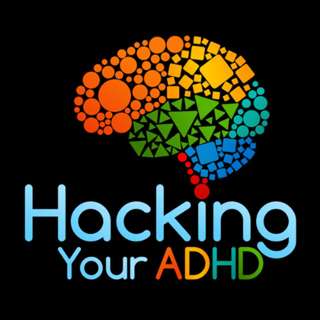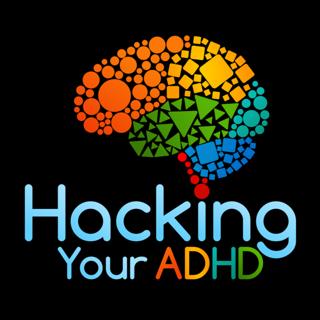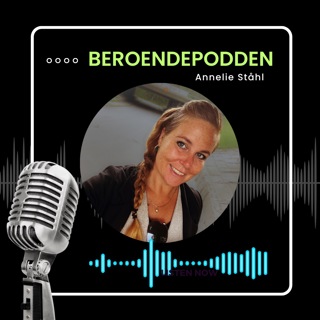
The Myth of Lazy
In last week's episode, I talked about the Hot-Cold Empathy Gap and how it can be hard for us to really remember or predict how our state is going to affect our actions - one of the consequences of this is that we often label ourselves as lazy when we didn't do something. Our cold state brain tells us that we should have just done the thing, all the while neglecting how we felt. This disconnect is what leads to a lot of our self-judgment and in particular, those of us with ADHD often find ourselves labeling ourselves as lazy. Why didn't I walk the dogs? I was feeling lazy - or maybe I feel overwhelmed with work or maybe I couldn't find the leashes. When we don't do something it's easy to label it as lazy, but often that doesn't tell us what was really going on. Today we're going to be exploring the idea of lazy and how what we might want to start looking at it a bit differently. Support me on Patreon Connect with me on: Twitter or ask me a question on my Contact Page Find the show note at HackingYourADHD.com/lazymyth
6 Sep 202117min

Why We Make Decisions We Don't Understand
Why do we make bad decisions in the moment? We've all done things that we regret doing right? yeah me, neither - but let's say hypothetically there was something that we regretted doing - something that we said or did that we feel like doesn't really reflect on as a person. Why is it I can have the best of intentions and still when it comes time I still make the wrong decision? Today we're going to be exploring the hot-cold empathy gap and why it can be so difficult for us to predict what we're actually going to do in the moment. Support me on Patreon Connect with me on: Twitter or ask me a question on my Contact Page Find the show note at HackingYourADHD.com/empathygap This Episode's Top Tips The hot-cold empathy gap occurs when we fail to predict how our emotions are going to affect our decision-making when we're in that state. This doesn't only apply to things like being angry or depressed but can also apply to our motivation or energy levels. Our ADHD can easily let us overcommit on projects because we fail to predict that we might have less drive and motivation when it comes time to actually do the task. We can work on mitigating some of the effects of the hot-cold empathy gap by making the decisions we want to make easier to make in the moment. We can also use tools like accountability and breaking down our tasks to keep us on track.
30 Aug 202114min

The Trap of Low Quality Leisure Time
Hey team, good news, I am finally over Covid - it took me a bit longer than I would have liked but I'm healthy again and ready to get back at things. This is an episode that I started working on before I got sick, and one of the areas that we had been looking into was that of planning and goal setting. So I thought it was time to shift a bit onto an area that we often forget about - leisure time. Now, I want to be clear here, leisure time is not in opposition to goals and planning, in fact, it's just as important to our well-being. There are a myriad of health benefits we get from taking time off work, but not all leisure activities are equal. In this week's episode, we're going to be looking at how we can work on reframing the ways we look at our free time, how we can be a little more intentional with how we're spending that time, and then look at a few of the things we can do to make that time, time well spent. Support me on Patreon Connect with me on: Facebook Twitter Instagram or ask me a question on my Contact Page Find the show note at HackingYourADHD.com/leisure This Episode's Top Tips You don't have to earn your time off - denying ourselves real leisure time because we "didn't earn it" is counterproductive only leads to burnout. Don't rely on discipline to keep yourself from falling into low-quality leisure time like scrolling social media - use blocks on your phone to divert yourself from the path of least resistance. Our five pillars of quality leisure time are: Prioritize doing, over consuming Prioritize things that take some skill to do Think about making something Seek activities that foster social interaction Prioritize Self-Care
23 Aug 202115min

The Wall of Awful with Brendan Mahan (rebroadcast)
We've all got things that we think we should be able to just do - for example, I've had on my to-do list for weeks to make a phone call to the bank - it won't even take that long, but I keep putting it off. I keep finding reasons not to do it - what I've done is I've created a wall of awful around making this phone call (really most phone calls) and the more I put it off the more it builds it up. Today we've got Brendan Mahan from ADHD Essentials to explain what the Wall of Awful is and some ways that we can work on getting past it. Support me on Patreon Connect with me on: Facebook Twitter Instagram or ask me a question on my Contact Page Find the show notes at HackingYourADHD.com/wallofawful This Episode's Top Tips The Wall of Awful is the emotional impact of repeated failure and it makes activating on tasks even more difficult While our wall starts off being built up with failure bricks, it is also built with things like disappointment, rejection, and shame. It doesn't matter if these bricks are based in reality, it matters how you perceive them. There are 5 ways people try to get past the Wall of Awful, two don't work, one works, but is damaging to our relationships, and then two that work - the two that don't work are staring at it or trying to go around it - the one that works but is damaging is trying to hulk smash through the wall - the two that work that we want to focus on are climbing the wall and putting a door in our wall Climbing the wall is about sitting with the emotion that built up our wall and understanding what's stopping us - it can often look like staring at the wall, but it's more about gearing yourself up to get over the wall Putting a door in the wall is about changing your emotional state so that you can get past the wall - it could be doing things like taking a walk, listening to some energizing music, or watching a funny TV show to brighten your mood. Make sure that when you are trying to put that door in that you aren't actually just trying to go around the wall - it's easy to let that one TV show turn into four because you were just looking for a way to procrastinate.
16 Aug 202119min

Building Gratitude (rebroadcast)
One of the hottest trends to come out of the self-help world over the last few years is gratitude. And it's no surprise, gratitude has been found to be one of the greatest indicators of overall well-being. I'm usually pretty skeptical about things that get hyped quite as much as gratitude has been - I mean when you see the list of things that a gratitude practice can help with it's pretty easy to roll your eyes. I mean can gratitude really do all those things that people say it can? Today we'll be exploring the mechanisms that make gratitude work - and also perhaps tempering some of the hype around it - then we'll be looking at ways we can find things to be grateful in our lives as well as looking at some ways that we can start a gratitude practice. And I'll admit, this episode is a little less ADHD-focused - but gratitude was something that was on my mind, for reasons that I get into during the episode. And so even though this episode is a little less ADHD specific I still think everyone can get a lot out of it. Support me on Patreon Connect with me on: Facebook Twitter Instagram or ask me a question on my Contact Page Find the show note at HackingYourADHD.com/gratitude This Episode's Top Tips Gratitude is showing thanks and appreciation and it has a tremendous impact on our brains. Gratitude can help us release build our relationships, regulate stress, improve sleep quality, build self-esteem and make us happier. One way we can practice gratitude is through mindfulness and seeing all the things in our lives that are going right. It's easy for us to latch onto the negative things that happen during our day. We'll miss all the things that went right because when things go according to plan they can often become invisible. We can also practice gratitude by journaling or writing a letter to someone in our lives that has greatly impacted us.
9 Aug 202119min

How To Save Time with Sequencing (rebroadcast)
Sequencing is all about the order in which we do things. Sometimes it seems like it doesn’t matter what comes first, but also try putting your pants on after you put on your shoes. Sequencing is something I’ve come to realize is a big deal with ADHD. The order in which we do things has a big impact on our overall productivity, but more than that, some of our other issues with ADHD make the sequence in which we do things much more important. Today we're going to be exploring how the order we do things is important for our ADHD brains and then we'll be looking at some ways that we can use sequencing to our advantage. Support me on Patreon Connect with me on: Facebook Twitter Instagram or ask me a question on my Contact Page Find the show note at HackingYourADHD.com/sequencing This Episode's Top Tips Sequencing is order in which we do things and it matters because it can have a big impact on how we remember things and execute our plans. Planning can help with our ability to sequence things properly - one technique that can be especially helpful in making sure we don't forget steps is to start our planning from the end and working our way backwards. Part of sequencing is making sure that we're paying attention to tasks that will get us off track and making sure we're not putting those right before things we actually want to do. Batching tasks is a great way to make sure we're not getting ourselves off track - but remember we don't have to an entire batch at once, we can still break batches into reasonable chunks.
2 Aug 202117min

Personal Energy Management (rebroadcast)
Hey team, I'm going to be taking a little time off in August and I thought that I'd dredge up a few episodes from the archives. Today we're going to be hitting on an idea that has been a reoccurring theme in the last few episodes and that's personal energy management. While many of us have realized that we only have so much time in our day, we tend to still believe that we're going to have the same amount of energy from sun up to sundown. But we know this isn't true. Our energy levels vary throughout the day and if we want to be getting the most out of our days we have to try and work with these rhythms of energy. Today we're going to be discussing how we can work on creating our schedules around when we do have energy instead of just when we've got a free spot on the calendar. We'll be looking at some of the different areas of energy management as well as how our energy levels fluctuate throughout the day. And we'll also spend a little time on how you can make a little more energy. Support me on Patreon Connect with me on: Facebook Twitter Instagram or ask me a question on my Contact Page Find the full show note at HackingYourADHD.com/energymanagement This Episode's Top Tips Energy management is about realizing it's not just about how many hours you have in the day, but also how much energy you've got during the day. Your energy levels are going to fluctuate up and down throughout the day, and if you want to get the most out of your schedule try scheduling your most important tasks during your high energy times, preferably early in the day. Limit your commitments so that you have enough time to work on the projects that are important to you. If you're low on energy try having some water or a healthy snack - you can also try to change your state by listening to some music or going on a short walk.
26 Juli 202114min

Celebrating Your Wins
I want to start this episode off by saying that this is something I'm bad at - and not in the sense that what I do to celebrate is bad or that I'm not celebrating the small wins throughout my day. It's bad in the sense that I almost entirely skip the whole thing. Recently this podcast tipped past half a million downloads. That's a pretty big milestone and is pretty indicative of how successful this endeavor has been. But it was barely a blip for me. I didn't want to acknowledge the success because it can be hard for me to acknowledge when I do things well. So this episode is as much for me as it is for all of you and in this episode, we're going to be exploring what it means to have small wins and also how we can celebrate them. Support me on Patreon Connect with me on: Facebook Twitter Instagram or ask me a question on my Contact Page Find the full show note at HackingYourADHD.com/winning This Episode's Top Tips Celebrating our wins is a way to boost our confidence and it will actively encourage us to seek out that same success again. We can differentiate intrinsic and extrinsic motivation by thinking of intrinsic as what to do because it's interesting and inherently satisfying. Extrinsic motivation comes from rewards or from avoiding punishment. Both can be important parts of how we celebrate our success. Start celebrating your wins by acknowledging when they happen and then letting yourself do something fun to celebrate that success. Don't get down on yourself when the wins aren't coming - we're not always going to have smooth sailing, but only focusing on what didn't happen tends to make us overlook all the good things that did happen.
19 Juli 202116min





















